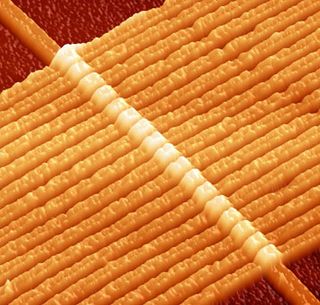HP Labs Teams With Hynix to Make Memristors
Is this the first step towards more advanced forms of AI?

Earlier this year, HP revealed that it has designed an electrical resistor with memory properties called "memristor," a technology that is simpler than existing transistors, and does not require a constant electrical current to retain information.
The memristor technology can store and retrieve values outside the standard 1's and 0's, which opens up many new possibilities outside of traditional computing – such as artificial intelligence. That will take some time, but the base technology is ready.
HP announced this week a joint development agreement with Hynix Semiconductor to bring the memristor to market in future memory products.
The two companies will jointly develop new materials and process integration technology to transfer the memristor technology from research to commercial development in the form of Resistive Random Access Memory (ReRAM). Hynix will implement the memristor technology in its research and development fab.
ReRAM is non-volatile memory with low power consumption that holds the potential to replace Flash memory currently used in mobile phones and MP3 players. It also has the potential to serve as a universal storage medium – that is, memory that can behave as Flash, DRAM or even a hard drive.
Memristors require less energy to operate, are faster than present solid-state storage technologies and can retain information even when power is off. The memristor also can perform logic, showing that memristor-based devices could change the standard paradigm of computing by enabling computation to one day be performed in chips where data is stored, rather than on a specialized central processing unit.
Read more about memristors here and check out the video below.
Stay on the Cutting Edge
Join the experts who read Tom's Hardware for the inside track on enthusiast PC tech news — and have for over 25 years. We'll send breaking news and in-depth reviews of CPUs, GPUs, AI, maker hardware and more straight to your inbox.
-
Jerky_san Huzah now maybe no one will have to pay the evil patent troll.. you know the one i mean @_@ evil rambusReply -
Travis Beane Nothing is perfect. Everything that has benefits also has flaws. Here's to hoping those flaws are ignorable.Reply -
dstigue That sounds insane. The more you add the more memory and computational power you get. I'll wait until I see it but this could open the doors to quantum computing.Reply -
zak_mckraken ReplyThe memristor technology can store and retrieve values outside the standard 1's and 0's, which opens up many new possibilities outside of traditional computing – such as artificial intelligence.
I really wonder how this could possibly used. Every variable can be summarized in 0's and 1's. Being able to store different values in one bit could reduce memory usage dramatically, but I can't see how it would offer anything new.
I might be missing something, but at any rate, innovation is always good! -
saturnus The potential for memristors are enormous. They're basically in this form a variarable resistance transistor, and as such in principle an analogue device. It has innumerable potential uses but the first uses will probably as the name implies be in memory products.Reply
Eg. it's a 1 transistor replacement for cache memory, cutting cache memories chip-realestate by 6 to 8 times while being both faster and consume less power.
It can also directly go into SDRAM and double it's capacity by not needing a capacitor to sustain the charge over the transistor while still being just as fast a on-chip cache.
But the real potential in memory use lies in that it in principle can store an infinite number of bits in a single transistor but a practical limit could be anywhere from 8 to 256 bits in a single transistor. All it takes is a high precision DA/AD converter to drive it. Tb single chips should be well within reach.
Speculating even further, it could potentially revolutionize computers as those memritors in principle also being analogue trasistors and therefore could make todays operations in 1/32th to 1/256th the chip real estate since it can perform everything with a single "bit". -
elbert Memristor is made from a thin film of Titanium dioxide. With this tech our CPU's cache can be logic circuitry as well as logic circuitry cache. This could indeed push performance many times over.Reply
Most of this is very old tech ideals. The resistance switching of titanium dioxide was described in the 1968 by F. Argall.
Most Popular








